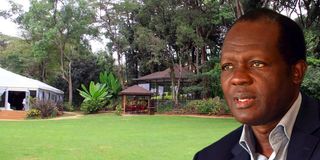Premium
Raphael Tuju suffers blow in Karen property case over Sh2.2bn debt

Mr Raphael Tuju's Dari Restaurant grounds. Mr Tuju lost control of his company, Dari Limited, over a Sh2.22 billion owed to the East African Development Bank (EADB).
What you need to know:
- Mr Tuju and his children wanted the court to block two receiver managers appointed by East African Development Bank.
- Mr Tuju also suffered another loss after the top court struck out several affidavits he had filed in support of the appeal.
The Supreme Court has rejected an application by former Cabinet Secretary Raphael Tuju to stop receiver managers appointed by a regional bank from taking over his property in Karen over a debt of Sh2.2 billion.
Mr Tuju and his children Mano, Alma and Yma alongside Dari Ltd wanted the court to block two receiver managers appointed by East African Development Bank (EADB) in December 2019, saying his appeal that is pending before the court might be rendered useless in case the lender is not stopped.
A bench of five judges of the apex court stated that the East African Development Bank could compensate the former Cabinet Secretary and his children, should they win the court battle after a full hearing.
“We are satisfied that the respondent remains a reputable international bank that should have no difficulty compensating the applicants if the applicants succeeded in their claim,” the bench led by Deputy Chief Justice Philomena Mwilu ruled.
The regional lender appointed Mr George Weru and Mr Muniu Thoithi of consultancy firm PricewaterhouseCoopers (PwC) as receiver managers for the 20 acre property and the high-end hotel, Dari, that is currently under the management of Tamarind, which Tuju had estimated to be worth Sh3.5 billion in 2020.
But Mr Tuju argued that the appeal would be rendered useless unless conservatory orders are issued, stopping the planned takeover.
He further submitted that the lender had instituted various insolvency proceedings are them, issued statutory demand notices, as well as appointing receiver managers to the the property, which is still charged to the bank.
The former Jubilee Party secretary-general said should his appeal succeed, they would not be able to recover monies from the bank because it enjoys immunity from legal proceedings.
The bank on its part informed the court that the receivership can be reversed and Mr Tuju adequately compensated, in case the court rules in his favour.
According to the bank, the debt has since risen to $29,253,298 and interest is still accruing.
At the same time, the court rejected an application by Mr Tuju to stop insolvency proceedings brought against him and his children saying the court below should be allowed to hear the cases.
“It is our finding that since, the proceedings the applicants seek to be stayed are not in the purview of this Court, it would only be right to afford the trial court the opportunity to render its decisions and if necessary, the dissatisfied party to follow the appellate hierarchy,” the judges said.
Mr Tuju also suffered another loss after the top court struck out several affidavits he had filed in support of the appeal after the regional lender said they were introducing new evidence to the case.
“We acknowledge that the supplementary affidavits seek to rebut averments made by the respondent. However, this does not extend to allowing the applicants to introduce additional evidence through the backdoor,” the court said.
In the four-year court battle, the bank said it advanced Dari Ltd $9.3 million loan in July 2015, which has since ballooned.
EADB says the debt, which it advanced on July 31, 2015, at $9.19 million (then Sh932.7m), has remained in default since 2017 when it fell due.
The loans were for the construction of Sh100 million two-storey, flat-roofed bungalows sitting on a 20-acre forested land dubbed Entim Sidai and the purchase of a 94-year-old bungalow built by a Scottish missionary, Dr Albert Patterson, which currently operates as a high-end restaurant.
The London court dismissed Dari’s opposition to the bank’s claim, setting the stage for the lender to seek enforcement and auction.
The UK judgment was adopted by the High Court in February 2020 but Dari Ltd moved to the Court of Appeal and suspended the takeover until last week.
Mr Tuju unsuccessfully fought the enforcement of the UK judgment up to the Court of Appeal, arguing that EADB was frustrating efforts to have other lenders, including KCB Group and equity investors, from making the property profitable.
In May, the Supreme Court agreed to hear the second appeal and granted Mr Tuju temporary orders, blocking the receiver managers from taking over the property.
The bank appointed the two receiver managers to run the affairs of Dari Ltd as a going concern but efforts to take over the property in Karen was thwarted by armed police officers who were stationed at the entrance.
In documents filed in court then, Mr Weru said despite serving the directors of Dari Ltd with court orders, they refused to allow them access or information of the company.
The receiver managers had then sought from Tuju and his children the company’s statement of affairs, financial returns and company records as well as cash books.
They had also asked for a list of debtors and creditors and the staff payroll.





